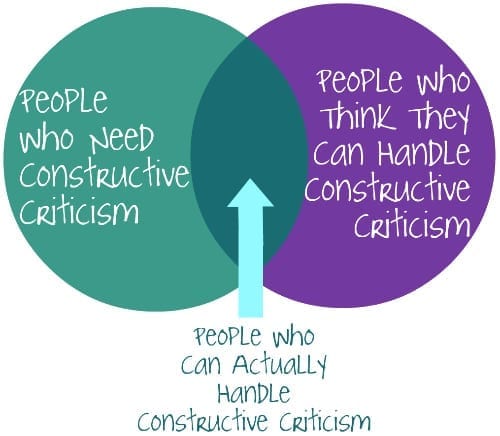Feb 17, 2012
Is Criticism Ever Constructive?
Is there such a thing as constructive criticism? I heard someone make a forceful case to say that no, there isn't, saying it's never welcome and is not productive and the "sandwich" approach, where you praise, then criticize, then praise is not helpful ("Do you think I'm a fool for not noticing?"). Yaakov waited till he was on his deathbed to rebuke his children. Moshe criticized the Jewish people only before his death and indirectly, with allusions.
Others disagreed. Some people express appreciation when their mistakes are pointed out. They don't want to repeat them! And even as it's uncomfortable to be on the receiving end of criticism, the question for the intellectually honest should be, "Is it true?"
And what about the mitzva to rebuke? And how can we do this mitzva when, long ago, the Gemara says (Erchin 16b) that our generation (meaning the time of the Gemara) no longer has anyone who can correctly deliver rebuke? Even more than that, there is no one in today's society who knows how to properly accept rebuke!
Apparently, the resolution lies in how the criticism is given, i.e. not as a personal attack, and not in a way that embarrasses the person. Refraining from constructively criticizing someone is safe, for no feelings are hurt, but ultimately, is silence an act of Ahavas Yisrael?
Subscribe to:
Post Comments (Atom)




I somehow had gotten myself into a situation in our community where I had been in charge of several kallah showers and others in the community simply assumed that they would sit back, relax, and send in a check when there was a need for a kallah shower. Then I found out that I needed surgery and I was busy with tests, reassuring lots of family members, etc. I was still being called to be responsible for these showers, even as my surgery date approached and friends knew of what was going on. A couple of good friends finally told me that, by assuming the responsibility on several occasions, I had let others off the hook and now, people were not offering themselves as they had been in the past. It was basically an oversight on my part for not getting others more actively involved and now, it was simply an assumption that I would involve myself no matter what. I didn't see it but others were able to point out where I went wrong.
ReplyDeleteDepends what criticism is for. If it's for someone who transgresses the Torah, you better first love the person and only then may you deliver criticism, which is why both these commandments appear in the Torah in one verse! If the criticism is because you DEEM the person is doing something wrong (other than a transgression), then be careful because ... you may well be seeing yourself in the mirror.
ReplyDeleteI explain here:
http://hezbos.blogspot.com/2010/07/mirror-image-by-divine-delivery.html